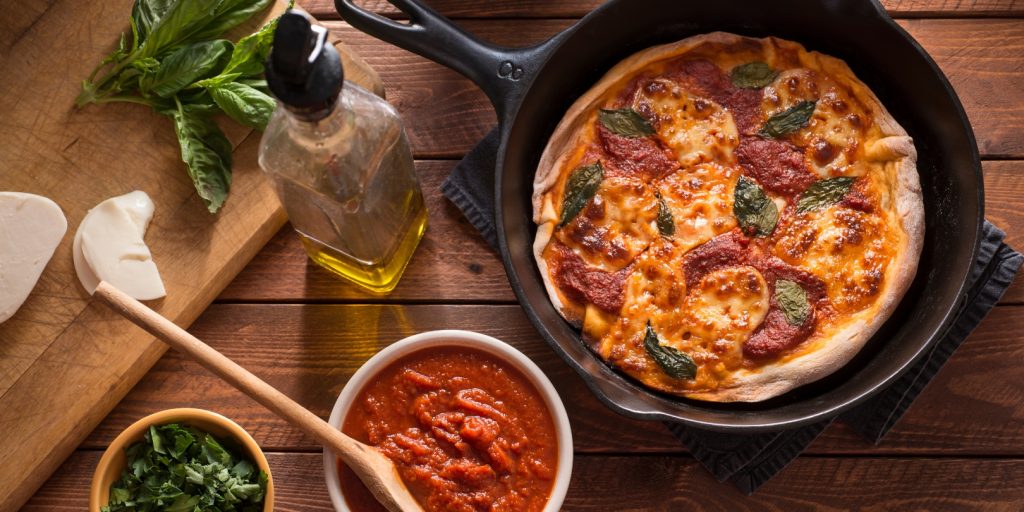Carbon Steel vs. Cast Iron: Which Is Better To Cook With?

Are you a cooking enthusiast looking for the best cookware to create restaurant-quality meals? Then you’ll need to familiarize yourself with the difference between carbon steel and cast iron cookware. While both materials are heavier than other types of cookware, they offer different benefits that can help you make the right decision.
In this post, we’ll discuss the benefits and drawbacks of each type of cookware. We’ll also explain how to care for and maintain both materials so you can get the most out of your investment. Read on to learn everything you need to know before cooking with carbon steel or cast iron.
Overview of Carbon Steel
Carbon steel is a lighter material than cast iron, yet its durability and heat retention capabilities still make it an excellent choice of cookware. It’s also quicker to season and easier to clean than cast iron, meaning less time in the kitchen prepping and cleaning up afterward. The carbon steel also takes up less space when stored in the cupboard because of its lighter weight.
Carbon steel can be more expensive than cast iron, and its thinner material requires more frequent seasoning. As with any other type of metal cookware, carbon steel must be taken care of properly to keep it from rusting or warping from extreme temperatures.
Overview of Cast Iron
Cast iron cookware is incredibly durable and long-lasting, provided you take good care of it. Cast iron skillets and pots are great for retaining heat over extended periods of time, making them ideal for slow-cooking recipes like stews or soups. A well-seasoned cast iron skillet with a lid also offers excellent non-stick properties for cooking omelets or other food types that tend to stick easily.
However, cast iron can be very heavy and bulky, making it difficult to handle and store in the cupboard or on the stovetop when not in use. Compared to carbon steel, cast iron is more likely to rust if not taken care of properly. It also requires much more upkeep when it comes to seasoning and cleaning throughout its lifetime.
Comparing Cooking Performance
In terms of heat retention, both carbon steel and cast iron do an excellent job at maintaining heat over an extended period of time; however, cast iron tends to retain heat better than carbon steel due to its thicker material, which helps keep food warmer for longer after being taken off the burner or oven.
Carbon steel comes out on top for better heat distribution when cooking various foods – such as evenly cooked pancakes or steak – because its thinner material will distribute heat quicker than cast iron’s thicker material across all areas of the pan’s surface area.
Comparing Cleaning and Maintenance
Besides seasoning, prioritizing the cleaning of your cookware is crucial to maintain your health by preventing the growth of bacteria in the pan or pot’s surface crevices over time. Avoid using abrasive materials to remove stuck-on food particles. Carbon steel is easier to clean and requires less scrubbing than cast iron. On the other hand, cast iron offers superior durability and longevity due to its resilient composition and resistance to warping. However, modern carbon steel cookware designs now incorporate forged construction methods for enhanced durability. Before purchasing, always check the manufacturer’s recommendations and warranties.
Comparing Price and Availability
Regarding cost, stainless steel and aluminum cookware generally tend to be more affordable than cast iron or carbon steel options. However, they can still offer similar performance results if properly cared for in cleaning and maintenance. This is especially beneficial for those on a budget who prefer not to overspend without a specific reason other than personal preference.
Availability is another factor to consider when choosing a cookware material. Stainless steel and aluminum options are generally easier and cheaper than carbon steel or cast iron models. While the latter options are still available, they may require more online research or visits to specialty shops, depending on your region or country. It’s advisable to do thorough research in advance before making a purchase.
Conclusion
Based on our comparison between carbon steel and cast iron cookware, both materials offer excellent benefits in heat retention, heat distribution, ease of cleaning, and durability. Cast iron tends to be the stronger material of the two and is a great choice if you’re looking for cookware that will last for generations, while carbon steel is the lighter option and is easier to clean and season. Ultimately, deciding which material to choose largely depends on your preferences and budget. Whichever you choose, take proper care and follow the manufacturer’s instructions for maintaining your cookware to get the most out of your investment.